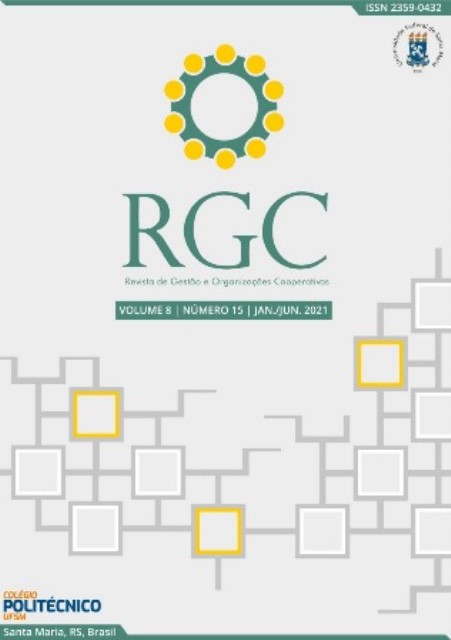Satisfação no trabalho versus resultado contábil: estudo de caso em uma cooperativa de crédito
DOI:
https://doi.org/10.5902/2359043242467Parole chiave:
satisfação no trabalho, cooperativa de crédito, desempenho econômico e financeiroAbstract
O presente estudo teve por objetivo verificar o nível de satisfação no trabalho e se o mesmo tem relação com o resultado contábil atingido. Foi utilizada metodologia quantitativa e descritiva, com coleta de dados por meio de aplicação de questionário em uma cooperativa de crédito, com a participação de 102 respondentes. Os participantes deram uma nota entre 1 e 7 para cada uma das questões, onde a nota de 1 a 3 vai de muito insatisfeito até insatisfeito, nota 4 indica que o quesito é indiferente, seria o equilíbrio entre estar satisfeito ou insatisfeito e por fim, as notas de 5 a 7 correspondem de satisfeito até muito satisfeito. Os resultados indicam que, quanto ao nível de satisfação os resultados mostram que, de forma geral, os colaboradores se mostram satisfeitos, visto que a maior parte das respostas se concentra nas notas 6 e 7. Percebe-se que as dimensões “Relação com Colegas”, “Chefia” e “Natureza do Trabalho” há maior satisfação quando comparado com as dimensões de “Salários” e “Promoções”. Quanto aos “Salários”, somente 9,6% das notas ficaram concentradas na nota mais alta. Quanto a correlação, os resultados não se mostraram significativos, evidenciando a não relação entre o Nível de Satisfação e o Desempenho econômico e financeiro auferido.
Downloads
Riferimenti bibliografici
AZEVEDO, A.J.D.; EGITO, T.D.T. Fatores que influenciam a satisfação do trabalho: um estudo de caso da Godim Imóveis. Rio Grande do Norte: UFRN, 2012.
BION, E.N. Satisfação no trabalho: um estudo de caso na biblioteca da Universidade do Vale do Itajaí no Campus de São José. 2004. 94 f. Relatório de estágio (Graduação em Automação de Escritórios e Secretariado) - Universidade do Vale do Itajaí, São José, 2004
GIL, A.C. Métodos e técnicas de pesquisa social. Editora Atlas. 6ª ed. São Paulo, SP. 1999.
GOULART, E. L.; RODRIGUES, C. S.; MOREIRA V. R,; WEYMER A. S. Q. A Relação Entre os Indicadores de Recursos Humanos e o Desempenho EconômicoFinanceiro das Cooperativas Agropecuárias Paranaenses, Revista de Gestão e Organizações Cooperativas - Santa Maria, RS, v.5, n.9 Jan./Jun 2018.
HEDLER, D. L., CASTRO, A. L. Satisfação do servidor público no trabalho: um estudo de caso nos centros de referência de assistência social de Paranavaí. Ciência Jurídica Empresarial. Londrina, PR. v. 16, n. 2, p.192-198, Set. 2015.
LIMA, E. M. e CORRAR, L. J. Comparação de desempenho entre as empresas melhores e maiores apontadas como melhores para trabalhar. Revista de Contabilidade do Mestrado em Ciências Contábeis da UERJ (online). Rio de Janeiro, RJ. v. 14, n. 13. P. 43. Set/Dez, 2009.
MARTINS, V.R.C. Análise da satisfação no trabalho: estudo de caso entre os funcionários da CoPP –Coordenadoria de Proteção do Patrimônio da Universidade de Brasília (Monografia do Curso de Gestão Universitária), Brasília, 2010.
MASIERO, G. Introdução a administração de empresas. São Paulo. Atlas, 2008.
MEINEN, E., PORT, M. O cooperativismo de crédito ontem, hoje e amanhã. Editora Confebras. 2012. Brasilia.
NICELETII C. D.; FABRICIO, A.; CARNEIRO, C. Satisfação no Trabalho de Colaboradores de uma Instituição Financeira Cooperativa. XXIII Seminário Internacional de Ensino Pesquisa e Extensão. Universidade de Cruz Alta – UNICRUZ, 2018.
NODARI, C. H; BÓ, G.D; CAMARGO, M.E. Turonover e Satisfação no trabalho em uma Empresa Multinacional: Um estudo de caso. Revista Administração da UNIMEP, v.8, n.2, Maio/Agosto, 2010.
OLIVEIRA, D., CARVALHO, R. J. E ROSA, A. C. M. Clima Organizacional: Fator de Satisfação no Trabalho e Resultados Eficazes na Organização. Anais do IX Simpósio de Excelência em Gestão e Tecnologia. 2012.
PINHEIRO, M. A. H. Cooperativas de crédito: história da evolução normativa no Brasil. Editora BCB. 6ª ed. Brasília, DF. 2008.
REVISTA EXAME/VOCÊ S/A. Conheça as 150 melhores empresas para trabalhar de 2017. Disponível em: <https://exame.abril.com.br/carreira/conheca-as-150-melhores-empresas-para-trabalhar-de-2017/>. Acesso em 23 de março de 2018.
ROBBINS, S. P. Comportamento Organizacional. Editora Pearson Prentice hall. 11ª ed. São Paulo.
SANTOS, A dos; GOUVEIS, F.H.C; VIEIRA, P.S. Contabilidade das sociedades cooperativas: aspectos gerais e prestação de contas. Editora Atlas. 2ª ed. São Paulo 2012.
SANTOS, Eduardo da Cunha Lamounier F. et al. Satisfação no trabalho e correlação com desempenho: um estudo no instituto do meio ambiente e dos recursos hídricos do Distrito Federal. Monografia. 2012.
SESCOOP SP. Cooperativismo: Tipos de cooperativas. Disponível em: <http://portaldocooperativismo.org.br/cooperativismo/4/tipos-de-cooperativa/57>. Acesso em 23 de março de 2018.
SICREDI. Conheça o Sicredi: Histórico. Disponível em: <https://www.sicredi.com.br/html/conheca-o-sicredi/historico/>. Acesso em 23 de março de 2018.
SIQUEIRA, M.M.M. Medidas do comportamento organizacional. Ferramentas de diagnóstico de gestão. Porto Alegre: Artmed, 2008
O Índice de Capital Humano Watson Wyatt e o Desempenho da Empresa: Um impacto definitivo na riqueza dos acionistas. Disponível em: <https://www.researchgate.net/publication/297733138_The_Watson_Wyatt_Human_Capital_Index_and_Company_Performance_A_definite_impact_on_shareholder_wealth>. Acesso em 21 de agosto de 2018.
ORGANIZAÇÃO DAS COOPERATIVAS BRASILEIRAS. O que é cooperativismo. Disponível em: <https://www.ocb.org.br/o-que-e-cooperativismo>. Acesso em 21 de agosto de 2018.
WAGNER, J. A; HOLLENBECK, J. R. Comportamento Organizacional: criando vantagem competitiva. São Paulo, Saraiva, 2003.
##submission.downloads##
Pubblicato
Come citare
Fascicolo
Sezione
Licenza
Autores que publicam nesta revista concordam com os seguintes termos:
- Autores mantém os direitos autorais e concedem à revista o direito de primeira publicação, com o trabalho simultaneamente licenciado sob a Licença Creative Commons Attribution que permite o compartilhamento do trabalho com reconhecimento da autoria e publicação inicial nesta revista.
- Autores têm autorização para assumir contratos adicionais separadamente, para distribuição não-exclusiva da versão do trabalho publicada nesta revista (ex.: publicar em repositório institucional ou como capítulo de livro), com reconhecimento de autoria e publicação inicial nesta revista.
- Autores têm permissão e são estimulados a publicar e distribuir seu trabalho online (ex.: em repositórios institucionais ou na sua página pessoal) a qualquer ponto antes ou durante o processo editorial, já que isso pode gerar alterações produtivas, bem como aumentar o impacto e a citação do trabalho publicado (Veja O Efeito do Acesso Livre).







